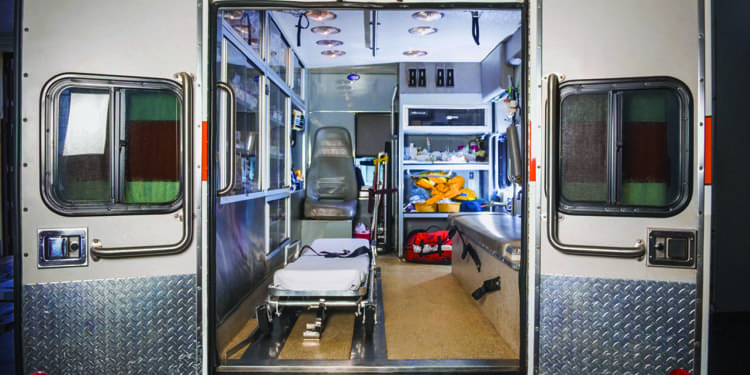ALBANY – In June 2021, a new Albany County pilot program to assist those involved in mental health crises began in the Hilltowns. Now officials are ready to roll it out as part of an expansion of mental health programs and services.
On Wednesday, Sept. 20, local officials gathered in Albany to announce that ACCORD (Albany County Crisis Officials Responding and Diverting) would expand into the City of Albany after an internal working group comprised of members of the Albany Police and Fire Departments analyze what processes, investments and protocols would be necessary to implement ACCORD in the city. The target date to start rolling teams in the City of Albany is 2025.
“This program works. We have had over 350 calls with the program,” Albany County Sheriff Craig Apple said. “This is ready to go now; it is proven and needed. If you want a program like this to be successful, the county should run it for all of the county.”
Currently, The program only runs in the Hilltowns, and according to Apple, it would be a great help to free up law enforcement for other calls.
He said that the program should be consistent in the way it operates, regardless of what municipality it operates in.
“I wish it could be run that way because I don’t think we will be as successful having different ways of operation,” he said. “We believe in this program, and it has been proven to work.”
The ACCORD program currently consists of two response teams with social workers from the county’s Mobile Crisis Team and paramedics from the Sheriff’s Department, who have been trained to handle situations involving mental health and nonviolent emergency cases where law enforcement is not essential. According to Apple, law enforcement responds to all the potential calls, then, if it is safe, the Accord team comes in.
“We then can connect the person with the services they need, whatever that may be,” Apple said.
In the first year of operation, 240 emergency calls were diverted to the ACCORD team resulting in 549 total encounters with 210 different individuals with the majority of calls related to general medical assistance and services/transportation for those experiencing immediate mental health emergencies, according to a September 2022 study of the program by SUNY Albany.
In most cases, the ACCORD team was able to de-escalate the situation, assess the individual’s needs, and offer coping strategies and referral services for care. The team also followed up with the individuals and their families to offer continued support and additional services when necessary.
“In the short time the ACCORD program has been in operation, the results have shown the need for more mental health staff supporting the needs of Law Enforcement,” Apple said at the time of the report’s release.
“Long before the pandemic, we were in the middle of a mental health and overdose epidemic. This was only made worse by COVID, the economic shutdown and isolation. On top of that, we are now faced with an affordability and homeless crisis. However, today we further show our commitment to getting Albany County residents the mental health and support services they need to recover, get back on their feet, and thrive,” Albany County Executive Daniel McCoy said.
According to McCoy, the county and City of Albany will commit $1.8 million to the full-scope of services including an expansion of the Albany Alternative and Treatment Court (Mental Health Court), the first time it’s been expanded since the pilot program was first launched in February of 2021. The Mental Health Court offers those charged with nonviolent misdemeanors or non-criminal violations an opportunity to be diverted into court-supervised and community-based services and treatment instead of facing incarceration. Additional funding will provide administrative support in order to expand the number of slots in the program, which currently stands at 15.
In order to address the ongoing homeless crisis, county funds would be utilized to reopen the former Mercy House homeless shelter in the City of Albany through a collaboration with Interfaith Partnership for the Homeless.
According to the county, the shelter closed in July 2022 due to rising costs of operations. Additionally, combined funding from Albany County and the City of Albany would support Albany CARES and an engagement program of social workers to directly interact with homeless individuals on the street to more effectively enter them into the system of care and find stable, long-term housing.
“The Albany County Legislature has one goal in mind when it comes to mental health crisis events in the area and that is, to keep everyone as safe as possible. The best way to do that is to provide tangible and proven successful resources to those struggling in crisis. These new investments will increase direct access to mental health professionals, create a new array of judicial services for those in need and increase shelter services. Thank you to our county legislators who passionately advanced these initiatives in partnership with the County Executive’s office and the City of Albany,” Albany County Legislature Chairman Andrew Joyce said.
The original ACCORD pilot program was funded in December 2020 with an initial investment of $170,000 to fund two additional social worker positions in the Department of Mental Health. Another $30,000 is being invested for the partnership between the county and UAlbany.
“Across the nation, communities are reimagining crisis response strategies. In Albany County we have developed a cutting-edge alternative that builds upon the Department of Mental Health’s decades of experience providing mobile crisis services and reflects emerging standards of community care,” said Dr. Stephen Giordano, Albany County Mental Health commissioner. “Partnering with the Sheriff’s Office to pair up mental health experts with medics provides a compassionate response to persons in crisis and frees up law enforcement to focus on public safety matters.”
SUNY Albany recommended to expand the ACCORD program in the 2022 report and called for a long-term investment that includes additional training and collaboration between police, local officials, mental health professionals and the community.




